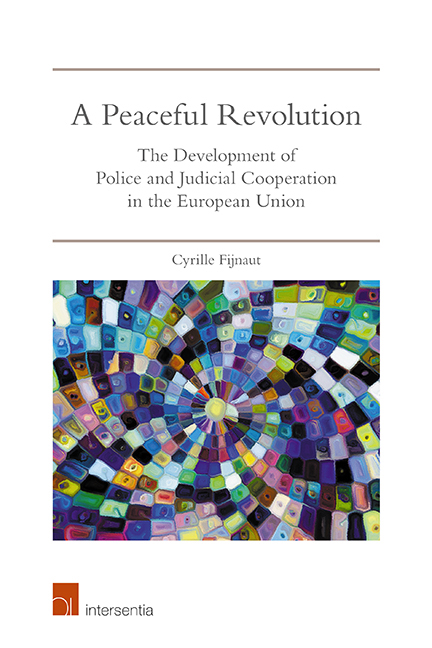Book contents
- Frontmatter
- Preface
- Contents
- List of Acronyms and Abbreviations
- Chapter 1 General Introduction
- PART I THE HISTORICAL BACKGROUND TO POLICE AND JUDICIAL COOPERATION IN THE EUROPEAN UNION
- PART II THE FOUNDATION OF POLICE AND JUDICIAL COOPERATION IN THE EUROPEAN UNION
- PART III THE CURRENT STATE OF POLICE AND JUDICIAL COOPERATION IN THE EUROPEAN UNION
- Bibliography
- About the Author
Chapter 1 - General Introduction
Published online by Cambridge University Press: 09 November 2019
- Frontmatter
- Preface
- Contents
- List of Acronyms and Abbreviations
- Chapter 1 General Introduction
- PART I THE HISTORICAL BACKGROUND TO POLICE AND JUDICIAL COOPERATION IN THE EUROPEAN UNION
- PART II THE FOUNDATION OF POLICE AND JUDICIAL COOPERATION IN THE EUROPEAN UNION
- PART III THE CURRENT STATE OF POLICE AND JUDICIAL COOPERATION IN THE EUROPEAN UNION
- Bibliography
- About the Author
Summary
The Treaty of Lisbon, which was signed in Portugal's capital by the heads of state and government leaders of the member states of the European Union (hereinafter: Union) on 13 December 2007, was their response to the rejection of the Treaty of Rome (or Constitutional Treaty) in France and the Netherlands in 2005. A comparison of the text of the Treaty of Lisbon with those of the treaties it amended – the Treaty on European Union from 1992 and the Treaty Establishing the European Community from 1957 – leaves no doubt that the treaty represented a genuinely radical reform of the states‘ relationship to the central institutions of the Union – the European Council, the Council, the Parliament, the Commission and the Court of Justice – and the relationship between the member states themselves in terms of police and judicial cooperation.
Although the governments of the member states tried to disguise the revolutionary nature of the treaty at the time, in its judgment of 30 June 2009 the German Federal Constitutional Court [Bundesverfassungsgericht] made it clear that the treaty marked a real breakthrough in constitutional relations within the Union in this field. The Treaty of Lisbon transferred cross-border police and judicial cooperation, which had until then been organised primarily in the intergovernmental context elaborated in Title VI of the Treaty on European Union, to the supranational framework set out in Title V of the third part of the Treaty on the Functioning of the European Union (the new name of the Treaty Establishing the European Community). The German Federal Constitutional Court therefore bluntly referred to the “supranationalisation” of police and judicial cooperation.
That judgment fully accords with what I wrote about the Treaty of Lisbon in a Dutch legal journal in February 2008 – that on its entry into force on 1 December 2009 the treaty would bring about a Copernican revolution in the field of police and judicial cooperation in the Union. This opinion was based on the simple fact that the treaty defined responsibility for freedom, security and justice as a shared competence of the Union and the member states and that, by extension, police and judicial cooperation would be largely supranationalised.
- Type
- Chapter
- Information
- A Peaceful RevolutionThe Development of Police and Judicial Cooperation in the European Union, pp. 1 - 6Publisher: IntersentiaPrint publication year: 2019



